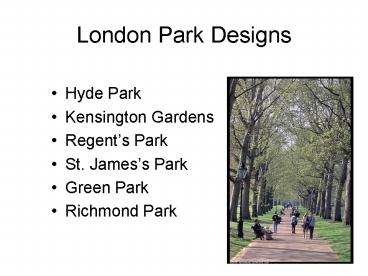London Park Designs - PowerPoint PPT Presentation
1 / 14
Title: London Park Designs
1
London Park Designs
- Hyde Park
- Kensington Gardens
- Regents Park
- St. Jamess Park
- Green Park
- Richmond Park
2
Hyde Park
- Henry VIII acquired Hyde Park from the monks of
Westminster Abbey in 1536 - It was a private hunting ground until James I
came to the throne and permitted limited access - In 1636 Charles I opened it to the general public
- In 1665, the year of the Great Plague, many
citizens of London fled the City to camp on Hyde
Park, in the hope of escaping the disease - It is central London's largest park with 350 acres
3
Hyde Park
- Childrens playground
- Horse riding track
- Boating on the Serpentine (artificial lake)
Nearest Underground Stations Lancaster Gate,
Marble Arch, Hyde Park Corner, Knightsbridge Nearb
y Attractions Science MuseumOxford Street
4
Kensington Garden
- William III bought what was originally part of
Hyde Park in 1689 - Kensington Gardens covers 260 acres
- For most of the 18th century the gardens were
closed to the public. They were opened gradually
but only to the respectably dressed
5
Kensington Garden
- The Round Pond - created in 1728 is favorite with
model boat enthusiasts used for skating in
winter - Dogs' cemetery started in 1880 by the Duke of
Cambridge while mourning one of his pets - The Diana, Princess of Wales' Memorial Playground
2000
Nearest Underground Station Lancaster Gate,
Queensway, Bayswater, High Street Kensington
Nearby Attractions Royal Albert HallNatural
History Museum
6
Regents Park
- Originally part of the Middlesex Forest, this
land became a royal hunting ground - The Prince Regent, later George IV, commissioned
the architect John Nash to create a park here in
1817 - In 1845, during the reign of Queen Victoria, it
became open to the general public two days a week - Also known as the 'jewel in the crown' the
Regent's Park (including Primrose Hill) covers
487 acres
7
Regents Park
- Offers a wide variety of activities two boating
lakes one for children, three playgrounds,
tennis courts, bandstand music, cafés, and an
open-air theatre - London Zoo
- Queen Marys Garden - 1930
Nearest Underground StationRegent's Park, Great
Portland Street, Baker St., St John's Wood,
Camden Town Nearby Attractions London
PlanetariumMadame Tussaud's
8
St. Jamess Park
- St James's Park is the oldest Royal Park in
London and is surrounded by three palaces
Westminster, St James's Palace, and Buckingham
Palace - The land was originally a marsh and was drained
by Henry VIII in 1532 to provide a deer park he
also built St. James's Palace - In the 17th century, Charles II commissioned the
French landscape gardener, André Le Nôtre, to
convert the deer park into a garden - Further landscaping was done in the early-19th
century by John Nash
9
St. Jamess Park
Nearest Underground Stations St. James's Park,
Westminster, Charing Cross, Victoria, Green
Park Nearby Attractions National Portrait
Gallery London Eye
10
Green Park
- Green Park once formed part of Henry VIII's
hunting grounds. - In 1669 Charles II had it converted into a Royal
Park - The park was opened to the general public in 1826
- During the 18th century Green Park was also a
favorite site for duels - Green Park covers 40 acres and with St James's
Park and Hyde Park, forms a chain of open spaces
11
Green Park
- Nearest Underground Station
- Green Park, Hyde Park Corner
- Nearby Attractions
- Buckingham Palace
- St James's Palace
http//www.dankarran.com/uk_photos/london33_450.jp
g
'Green Park'London, UKby Dan Karran
12
Richmond Park
- Richmond Park is one of the last remnants of the
great oak forests that surrounded London until
medieval times - In 1637 Charles I built a wall 8 miles long to
enclose the royal park as a hunting ground - Richmond Park is the largest Royal Park in London
covering an area of 2,500 acres - The park has hardly changed and is so well
preserved that in parts it remains more natural
than many areas of British countryside
13
Richmond Park
- Wildlife fallow, red deer, badges, and foxes
- Isabella Plantation woodland landscaped with a
stream, ponds and magnificent floral displays - Richmond Gate designed by 'Capability' Brown in
1798 it was here in 1536 that the king, staying
at Richmond Palace, awaited the signal that Anne
Boleyn, his former queen, had been executed at
the Tower of London
Nearest Underground StationRichmond Station
then 371 bus to Richmond Park Gate Nearby
Attractions Kew GardensHam House
14
Websites
- http//www.royalparks.gov.uk/
- http//www.touruk.co.uk/london_parks_gardens/londo
n_parks.htm































